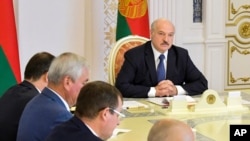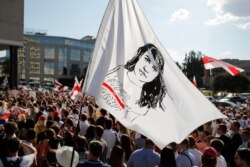Belarusian President Alexander Lukashenko is threatening to bring criminal charges against opposition leaders, as hundreds defied police and turned out in Minsk for another night of protests.
Thousands have been arrested and hundreds injured in the nationwide demonstration against what marchers say was a stolen presidential election. At least three protesters have died.
Lukashenko has called on Belarusian police to get even tougher on the demonstrators. Bu witnesses report police were standing by and making no drastic moves, as hundreds stood in the rain Wednesday night outside the interior ministry.
“There should no longer be any disorder in Minsk of any kind,” the official BelTa news agency quotes Lukashenko as saying. “People are tired. People demand peace and quiet.”
He also accused the West of financing the protesters and ordered security agents to “track down and stop the instigators of the unrest organizers.”
The European Union said Wednesday it does not recognize the results of the Aug. 9 election and says it will put sanctions on Belarus.
“The EU will impose shortly sanctions on a substantial number of individuals responsible for violence, repression and electoral fraud,” European Council President Charles Michel said after an EU emergency summit to discuss the crisis in Belarus.
German Chancellor Angela Merkel later told reporters the EU backs peaceful protesters in Belarus and a negotiated settlement to the upheaval.
"For us, it is clear that Belarus must find its own path. That must happen via dialogue in the country, and there must be no intervention from outside. The people in Belarus know what they want, what’s good for them," Merkel said.
A day earlier, Russian President Vladimir Putin, a longtime Lukashenko ally, asked Merkel, Michel and French President Emmanuel Macron not to interfere in Belarus's internal affairs. Putin has offered military assistance to Lukashenko.
Belarusian election officials say Lukashenko was reelected to a sixth term with 80% of the vote, and 10% for the only serious opposition candidate, Sviatlana Tsikhanouskaya.
“I call on you not to recognize these fraudulent elections,” Tsikhanouskaya said from exile in Lithuania. “Mr. Lukashenko has lost all legitimacy in the eyes of our nation and the world.”
She entered the race late after her husband, opposition blogger and would-be candidate Siarhei Tsikhanouski, was arrested.
Lukashenko took power in Belarus after it declared independence from the Soviet Union in 1991. He is known in the West as “Europe’s last dictator” for suppressing human rights, stifling free speech, allegedly rigging elections, and showing little tolerance for the opposition.
But his supporters say he has kept Belarus out of war and that people are working.
Lukashenko has sought to lighten his dictatorial image in the West by seeking better ties with the United States.







